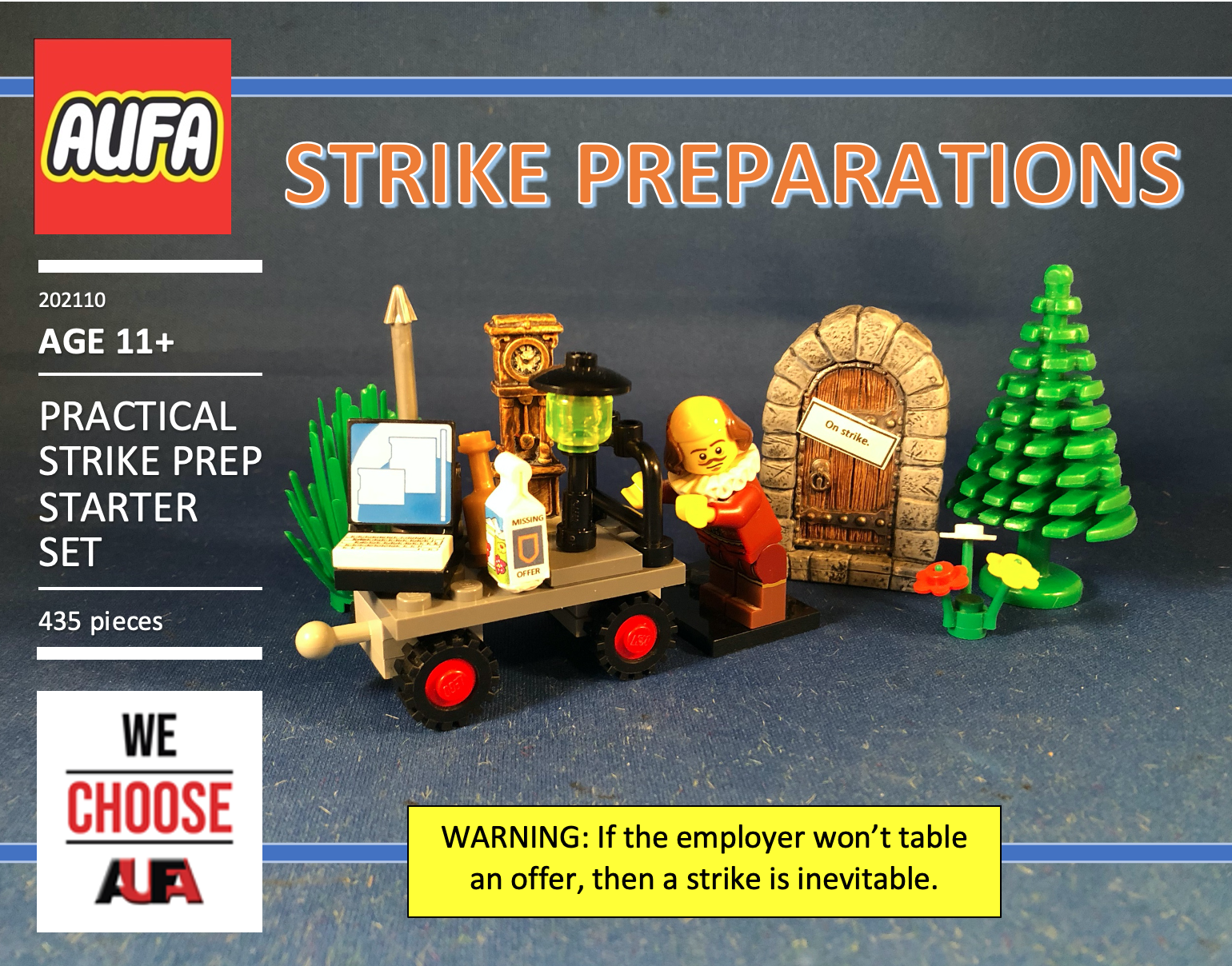Last week, AUFA provided some basic information about making financial preparation for a strike or lockout. This week, we’ll be discussing how to prepare practically and professionally.
Any job action is preceded by the long series of steps outlined two weeks ago in our strike primer. Once either party is in position to trigger a work stoppage, you will still have 72 hours of notice of any strike or lockout.
Access to AU Systems
Typically, union members have no access to workplace technology during a work stoppage. It would be wise to prepare for the possibility that AU will disable access to our email, files, and computers.
Preparations might include moving any personal or research files to a data stick or non-AU computer, recording important contact information and calendar events, creating and sharing a non-AU email address with colleagues, and ensuring you have access to a non-AU phone.
AUFA has been collecting non-AU contact information from members. If you have not yet provided this information (or if it has changed), please send your information to aufahq@aufa.ca. During any work stoppage, AUFA will use this information to deploy a new member communication platform.
Physical Access to AU
Employers typically restrict workers’ access to the workplace during a work stoppage. When notice of a strike or lockout is issued, staff who normally work on campus may wish to remove their personal property from AU’s buildings.
Grants and Research Projects
AUFA recognizes that some members have time-sensitive obligations related to their grants and research work. AUFA will not interfere with the timely completion of such tasks. It is not clear whether AU will be similarly accommodating.
Consequently, it is worthwhile identifying upcoming deadlines and planning ahead for how you will meet them. This includes ensuring that research colleagues and granting agencies have a way of contacting you if AU suspends access to AU IT.
Notifying Colleagues
Many of us work with colleagues in other organizations. As a work stoppage approaches, it may be necessary to alert them of the work stoppage and that it may impact our ability to respond promptly or meet previous commitments.
Prior to a work stoppage becoming imminent, it may be useful to identify people you work with outside of AU who may be affected by your absence and/or inability to access your AU IT. When a work stoppage appears imminent, send them an email outlining that a work stoppage is looming and outline how this may affect them.
You may also wish to ask your colleagues to refrain from dealing with AU until the work stoppage is ended. Academics, for example, may wish to ask academics at other institutions to refuse to approve transfer credit from AU and stop suggesting students come to AU as visiting students until the work stoppage is concluded.
Discussing a Work Stoppage with Students
Students will be negatively affected by a work stoppage. Some will see delays in teaching and marking. Others will see delays in administrative processes. AUFA will be communicating with AUSU and AUGSA about the timing and impact of a work stoppage, but you may also receive queries directly for students.
Here are some basic talking points that may be helpful in these conversations with students.
Faculty are seeking a reasonable cost of living increase to their wages after years of salary stagnation. AU has run operating surpluses almost every year for nearly a decade.
Faculty are also seeking to maintain long-standing rights (e.g., professional freedom) and make improvements in the workplace (e.g., addressing historical inequities and unsafe workplaces).
AU has not shown any receptivity to these legitimate requests. Indeed, the employer has not even seen fit to table a full offer of its own. This makes it impossible for faculty to bargain a new deal with AU.
The impact of a work stoppage on AU students is unfortunate. Nevertheless, AUFA members must look after their own interests and those of their families. Students who are frustrated can contact the AUSU (ausu@ausu.org) or AUGSA (president@augsa.com) or AU President Peter Scott (pscott@athabascau.ca) to express their concerns.
Students who have specific questions about how AU will operate during a work stoppage should consult the AU website or contact AU President Peter Scott (pscott@athabascau.ca).
The Job Action Committee hopes this brief overview will help you to begin practically and professionally planning for a possible work stoppage. We will continue to provide you more information about work stoppages as needs arise. Please direct any questions to Bob Barnetson (barnetso@athabascau.ca).
Bob Barnetson, Chair
AUFA Job Action Committee
